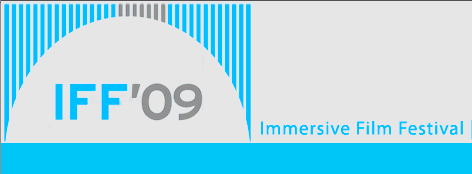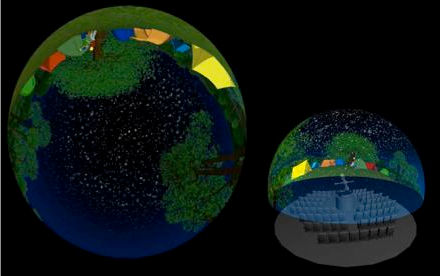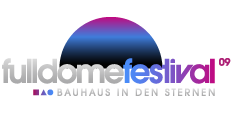FullDome
Immersive Film Festival, Espinho, Portugal

Navegar Foundation would like to invite all to participate and attend the Immersive Film Festival, to be held at Centro Multimeios Espinho, Portugal, on April 24th-26th 2009.
This festival is an event that will gather international productions in the Immersive Cinema field. It is an open invitation to all, including producers, animators, filmmakers, artists, students, teachers and planetarium professionals, in order to participate in this unique event.To participate, simply submit a work following the guidelines of the memorandum of understanding (MOU).
IFF will be focused on presenting productions in this media, along with a competition among submitted productions that made its debut recently. Besides the competition and the public screenings, public talks will be held to promote immersive cinema. Special screenings for primary and secondary schools will also be organized.
It is intended to be a space to captivate active members of cinema in general into this new media, a space to discuss ideas and to create partnerships, and above all, to work as a catalyser to the development of this area of cinema.
Immerse Yourself! Hope to see you at IFF 09.

blog comments powered by Disqus
3. Fulldome Festival im Zeiss-Planetarium Jena
Als Darstellungsraum für 360° Ganzkuppel (= FullDome) -Projektionen hat sich das Zeiss-Planetarium Jena mit dem All-Dome-Laser-Image-Projection (ADLIP)-System etabliert. Bereits zum dritten Mal findet dort am 24./25. April 2009 das FullDome Festival statt.
Die Initiatoren sind sich einig, dass FullDome die Möglichkeiten der räumlichen und filmischen Darstellung erweitert, und dass die Inszenierung von immersiven Erlebnissen in 360° für Medienkünstler ein zukunftsträchtiges Sujet darstellt. Im Mittelpunkt des Festivals stehen künstlerische Experimente und studentische Arbeiten in der 360-Grad-Kuppelprojektion. Aber auch professionelle Anwendungen für Planetarien und aus Bereichen wie Unterhaltung, Kunst, Wissenschaft, interaktive Welten und Musik beleuchten die Perspektiven, die sich der weltweit wachsenden Fulldome-Community und dem interessierten Publikum eröffnen. Die Ergebnisse und Preisträger werden beim 3. FullDome-Festival im Zeiss-Planetarium Jena am 24./25. April 2009 zusammen mit dem Sonderprogramm „Bauhaus in den Sternen“ präsentiert.

Festival Programm
Die FullDome Präsentationen und Festivalbeiträge erfolgen an zwei Tagen: zum studentischen Festival am 24. April und zum Festival-Summit am 25. April, mit den besten studentischen und allen anderen Arbeiten. Der genaue Programmablauf - auch zum Spezialthema „Bauhaus in den Sternen” wird an dieser Stelle veröffentlicht und beim Veranstalter www.planetarium-jena.de Bereits am 23. April findet im Zeiss-Planetarium Jena ein Vortrag des Trend- und Zukunftsforschers Matthias Horx zum Thema „Bauhaus revisited” statt, ebenfalls ein Beitrag zum Jubiläumsjahr „Bauhaus 2009″. Mehr zum Thema: www.horx.com und www.zukunftsinstitut.de
Allgemeine Teilnahmebedingungen
Einsendeschluss der Festivalbeiträge ist der 15. April. Alle eingesandten Festivalbeiträge werden nach einer Vorauswahl durch die Jury ausschließlich im Rahmen des 3. FullDome-Festivals im Zeiss-Planetarium Jena aufgeführt. Die Jury wählt unter den aufgeführten Beiträgen die Preisträger aus. Alle Einsendungen werden nach den gleichen Auswahlkriterien bewertet: Inhalt und Gestaltung, technische Umsetzung, künstlerische Ausführung, Kreativität, Originalität, narrative Qualität, Unterhaltungswert, sowie allgemein der Beitrag zur künstlerischen, innovativen und technischen Entwicklung des FullDome-Mediums.
Weiterführende Links
FullDomeFestival 2009
Bauhaus-Universität Weimar
liquidsound
Zeiss-Planetarium Jena
Die Initiatoren sind sich einig, dass FullDome die Möglichkeiten der räumlichen und filmischen Darstellung erweitert, und dass die Inszenierung von immersiven Erlebnissen in 360° für Medienkünstler ein zukunftsträchtiges Sujet darstellt. Im Mittelpunkt des Festivals stehen künstlerische Experimente und studentische Arbeiten in der 360-Grad-Kuppelprojektion. Aber auch professionelle Anwendungen für Planetarien und aus Bereichen wie Unterhaltung, Kunst, Wissenschaft, interaktive Welten und Musik beleuchten die Perspektiven, die sich der weltweit wachsenden Fulldome-Community und dem interessierten Publikum eröffnen. Die Ergebnisse und Preisträger werden beim 3. FullDome-Festival im Zeiss-Planetarium Jena am 24./25. April 2009 zusammen mit dem Sonderprogramm „Bauhaus in den Sternen“ präsentiert.

Festival Programm
Die FullDome Präsentationen und Festivalbeiträge erfolgen an zwei Tagen: zum studentischen Festival am 24. April und zum Festival-Summit am 25. April, mit den besten studentischen und allen anderen Arbeiten. Der genaue Programmablauf - auch zum Spezialthema „Bauhaus in den Sternen” wird an dieser Stelle veröffentlicht und beim Veranstalter www.planetarium-jena.de Bereits am 23. April findet im Zeiss-Planetarium Jena ein Vortrag des Trend- und Zukunftsforschers Matthias Horx zum Thema „Bauhaus revisited” statt, ebenfalls ein Beitrag zum Jubiläumsjahr „Bauhaus 2009″. Mehr zum Thema: www.horx.com und www.zukunftsinstitut.de
Allgemeine Teilnahmebedingungen
Einsendeschluss der Festivalbeiträge ist der 15. April. Alle eingesandten Festivalbeiträge werden nach einer Vorauswahl durch die Jury ausschließlich im Rahmen des 3. FullDome-Festivals im Zeiss-Planetarium Jena aufgeführt. Die Jury wählt unter den aufgeführten Beiträgen die Preisträger aus. Alle Einsendungen werden nach den gleichen Auswahlkriterien bewertet: Inhalt und Gestaltung, technische Umsetzung, künstlerische Ausführung, Kreativität, Originalität, narrative Qualität, Unterhaltungswert, sowie allgemein der Beitrag zur künstlerischen, innovativen und technischen Entwicklung des FullDome-Mediums.
Weiterführende Links
FullDomeFestival 2009
Bauhaus-Universität Weimar
liquidsound
Zeiss-Planetarium Jena
NASA sees potential in Immersive Visualisation
The NASA Commitee for Education & Public Outreach is holding a presentation at NASA Goddard Spaceflight Center. Speakers are David McConville, together with Dr. Carter Emmart (Hayden Planetarium at the American Museum of Natural History, New York) and Joel Halvorson about collaborations between media artists, scientists, and educators to use visualization tools (especially within dome theaters) for encouraging big picture thinking. Ever wanted to know, how Cingo Studios might help you with concept and visualization? Watch the webcast and you will get some ideas.
Absorbing the Big Picture: Immersion and Interactivity in Science Education
Rapid advancements in communication technologies are enabling unprecedented opportunities for science outreach and education. High-speed networks, video game engines, scientific visualization toolkits, geospatial viewers, innovative input devices, and immersive digital displays are increasingly at the disposal of both formal and informal education specialists. However, new technologies too often provide little more than temporary novelty if they're not thoughtfully integrated with other pedagogical elements to create meaningful and compelling experiences.
In this lecture/presentation, David McConville will illustrate the ways in which new interactive technologies and spatially immersive displays can be utilized to more fully engage students and the public in the science education process. Applying findings from cognitive psychology, gaming theory, and experiential education research, he will demonstrate how new collaborative and socially-oriented visualization tools have the potential to enable more intuitive and self-directed learning for students, scientists, policy makers, and the public.
About The Speaker
David McConville is a media artist and researcher focused on the development of the most compelling uses of immersive virtual environment displays. He is the co-founder and Director of Noospheric Research of The Elumenati, a full service design and engineering firm specializing in the development and deployment of immersive visualization experiences. The Elumenati provides systems integration, real-time software design, immersive content research, custom fabrication, and optical engineering for broad range of clientele. David holds a BSc in Music and Audio Engineering from the University of North Carolina Asheville, and he is currently a PhD candidate through the Planetary Collegium at the University of Plymouth.
Off Site Access Watch this presenation here. NOTE: You will need to have Microsoft MediaPlayer installed to view this presentation.
Download the presentation as a PDF for free:
"Absorbing the Big Picture: Immersion and Interactivity in Science Education" (44.6 MB)
Absorbing the Big Picture: Immersion and Interactivity in Science Education
Rapid advancements in communication technologies are enabling unprecedented opportunities for science outreach and education. High-speed networks, video game engines, scientific visualization toolkits, geospatial viewers, innovative input devices, and immersive digital displays are increasingly at the disposal of both formal and informal education specialists. However, new technologies too often provide little more than temporary novelty if they're not thoughtfully integrated with other pedagogical elements to create meaningful and compelling experiences.
In this lecture/presentation, David McConville will illustrate the ways in which new interactive technologies and spatially immersive displays can be utilized to more fully engage students and the public in the science education process. Applying findings from cognitive psychology, gaming theory, and experiential education research, he will demonstrate how new collaborative and socially-oriented visualization tools have the potential to enable more intuitive and self-directed learning for students, scientists, policy makers, and the public.
About The Speaker
David McConville is a media artist and researcher focused on the development of the most compelling uses of immersive virtual environment displays. He is the co-founder and Director of Noospheric Research of The Elumenati, a full service design and engineering firm specializing in the development and deployment of immersive visualization experiences. The Elumenati provides systems integration, real-time software design, immersive content research, custom fabrication, and optical engineering for broad range of clientele. David holds a BSc in Music and Audio Engineering from the University of North Carolina Asheville, and he is currently a PhD candidate through the Planetary Collegium at the University of Plymouth.
Off Site Access Watch this presenation here. NOTE: You will need to have Microsoft MediaPlayer installed to view this presentation.
Download the presentation as a PDF for free:
"Absorbing the Big Picture: Immersion and Interactivity in Science Education" (44.6 MB)
